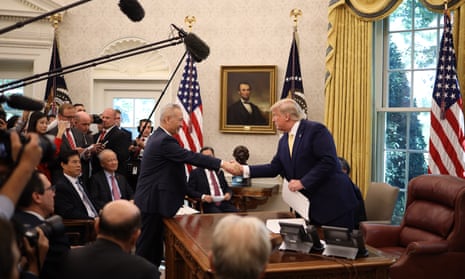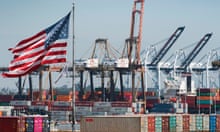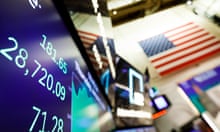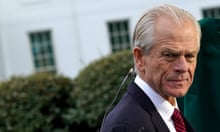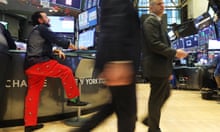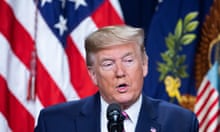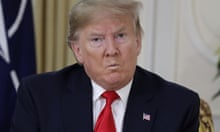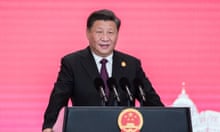A trade deal between the US and China is imminent and only delayed by the need to find a venue for a signing ceremony, according to Donald Trump.
After almost two years of wrangling over US import tariffs on Chinese goods, which sparked a tit-for-tat row between the world’s largest trading nations, the two sides were close to a comprehensive long-term trade agreement, the president said.
But shares in New York nosedived after Chinese officials appeared to cast doubt on the prospects for an agreement, when the sides were still discussing plans for an interim, “phase one” settlement.
Earlier this month Trump delayed plans to raise the tariffs on $250bn worth of goods to 30%, saying he would wait until mid-December when a further 15% tariff on almost all remaining Chinese imports including laptops, smartphones, footwear and clothing is due to be imposed unless a deal can be reached with Beijing.
Bloomberg News reported that private conversations with trade advisers in Beijing had revealed they remain concerned about Trump’s impulsive nature and the risk that he may back out of even a limited deal at the last minute.
Trump disputed this version of events, tweeting: “China and the USA are working on selecting a new site for signing of Phase One of Trade Agreement, about 60% of total deal, after APEC in Chile was canceled do to unrelated circumstances. The new location will be announced soon. President Xi and President Trump will do signing!”
The two sides were due to sign off the first phase of a deal at the Apec trade summit later in November until the host nation Chile was forced to cancel it following weeks of violent protests.
David Cheetham at the currency trader XTB said: “The latest comments from Beijing suggested that investors may be getting a little bit ahead of themselves in assuming a smooth de-escalation in trade tensions between the world’s two largest economies.”
The Dow Jones in New York slumped more than 200 points to below 27,000 and gold – considered a safe haven in periods of uncertainty – rose back above $1,500 (£1,145) an ounce to trade near its weekly highs.
Chris Beauchamp, the chief market analyst at the spread betting firm IG, said: “China appears not to trust Donald Trump over the putative trade deal.” He said markets remained “acutely sensitive to any trade war headlines”.
Trump also depressed shares after he attacked the Federal Reserve for limiting its interest rates cuts to three-quarters of a percentage point this year, down to a range of 1.5%-1.75%.
The Federal Reserve completed the third of its rate cuts on Wednesday, initially cheering investors who, like the president, have called for lower interest rates as a bulwark against a slowing economy.
The president harangued the central bank’s chair Jerome (Jay) Powell for not following Europe and Japan’s central banks in cutting interest rates to below zero.
Trump wrote: “People are VERY disappointed in Jay Powell and the Federal Reserve. The Fed has called it wrong from the beginning, too fast, too slow. They even tightened in the beginning. Others are running circles around them and laughing all the way to the bank. Dollar & Rates are hurting … our manufacturers. We should have lower interest rates than Germany, Japan and all others. We are now, by far, the biggest and strongest Country, but the Fed puts us at a competitive disadvantage. China is not our problem, the Federal Reserve is! We will win anyway,” he tweeted.
Analysts have blamed the bulk of the decline in global trade and the slowdown in US GDP growth on Trump’s import tariffs, which have increased the price of Chinese imports and sparked a row that has hit US exports to China.
